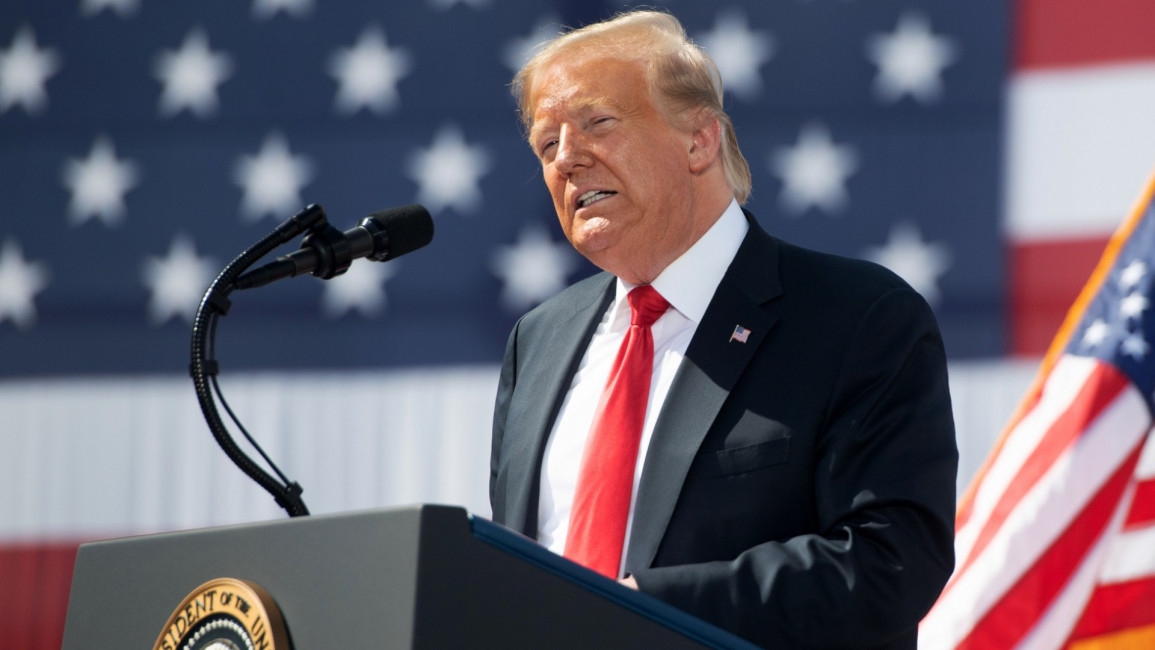Trump mulls ending 'crucial' congressional review of foreign arms sales despite Saudi Yemen war concerns
Trump mulls ending 'crucial' congressional review of foreign arms sales despite Saudi Yemen war concerns
Donald Trump may put an end to a decades-long practise of reviewing arms sales to foreign governments over humanitarian concerns.
4 min read
Trump's administration may end the congressional review [Getty]
Donald Trump’s administration may put an end to four-decades long practise of reviewing, and if necessary blocking, arms sales to foreign governments over humanitarian concerns, with critics worried that this could make it easier to sell weapons to Saudi Arabia for use in its Yemen war.
The White House is considering ending the process, which allows the Senate Foreign Relations and House of Representatives Foreign Affairs Committee to block arms sales to certain countries.
“There is a fear that has existed for quite a long time that the administration would end this,” one aide told Reuters.
Congressional aides insisted ending the review process was opposed by both members of the Republic-led Senate and the Democratic-led House of Representatives.
Last year Secretary of State Mike Pompeo attempted to bypass the review by declaring a state of national emergency in order to complete $8 billion in military sales to the Saudi kingdom as well as other Gulf states.
At the time, members of Congress delayed the sales on the basis of the potential colossal loss of civilian life in the war in Yemen, as well as human rights abuses, such as the murder of Washington Post journalist Jamal Khashoggi at the Saudi consulate in Turkey.
Senator Bob Menendez, the top foreign relations Democrat, has placed “holds” on sales to Saudi Arabia, citing rights concerns.
“The American public has a right to insist that the sales of US weapons to foreign governments are consistent with US values and national security objectives. Consequently, the Congress is charged with exercising effective oversight of such sales,” Menendez said.
In June 2019 a State Department inspector general began an inquiry into whether Pompeo and other aides acted illegally in that instance.
Read more: Yemen in Focus: Allies turn rivals on strategic Socotra island
Before the inspector completed the inquiry, Trump fired them last month.
Under the current system, Congress has a say
Under the current system, the State Department notifies foreign policy committees in Congress to the proposed arms sales.
Lawmakers then provide comments to administration officials, who take it to agencies who then make adjustments before it is approved by Congress in an informal setting.
|
Getting rid of the informal part of the process means that in order to block an arms deal, Congress would need support from two-thirds of both chambers to overcome a presidential veto.
“This is not just a thumb in the eye to Democrats, this is a thumb in the eye to Republicans and to all of Congress,” Max Bergmann, a senior adviser at the State Department during the Obama administration told The New York Times.
“The way the arms sale process has worked is one of the rare bipartisan mechanisms that has existed no matter who controls the White House and Congress.”
Such congressional oversight is important, especially given Jared Kushner’s “direct channel with Crown Prince Mohammed bin Salman”.
The senior advisor to the US president, and Trump’s son-in-law reportedly communicates with MbS using Whatsapp.
The process has been used repeatedly in arms sales to Gulf states.
Clashing with Trump
If Trump puts an end to congressional review, it could mean an increase in the sale of American weapons to countries with high civilian casualties or human rights abuses.
Saudi Arabia has used weapons purchased from the US to wage a war in Yemen which has killed thousands of civilians and caused one of most prolific humanitarian crises in the world.
Lawmakers reportedly placed a hold on a new package to Saudi Arabia, which included technology that would connect military databases with those belonging to domestic security forces.
According to The Times, the package had not been reported publicly and had raised concerns among lawmakers because of domestic rights abuses by Saudi authorities.
And it’s not just Saudi Arabia that could stand to gain weapons; ending the review could free up predator drones to the United Arab Emirates; attack helicopters to Egypt and missile, bombs and machine guns to Turkey, officials told The Times.
The review allows Congress to check hundreds of proposed arms sales packages each year.
Critics believe Trump’s consideration to end the review comes because of a particular part of the process, referred to by a legislative aide as a “gentleman’s agreement” in which lawmakers could put a freeze on sensitive arms packages by continuing to put forth questions during the informal period.



